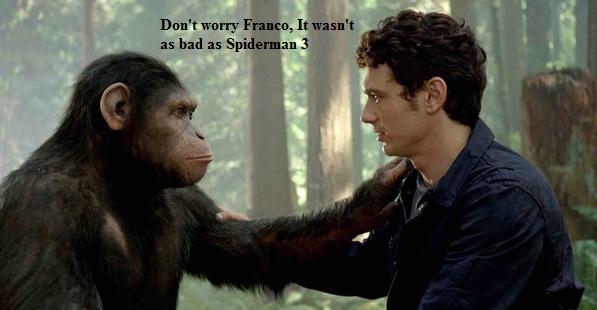Rise of the Planet of the Cinematically Challenged: How the fuck did this pull in $167 Million?
So I was driving the other day when I was caught behind a rusty Saab with spinning rims. Despite how hilariously disgusting it was, I wasn’t laughing at this Saab, as the driver believed cruising at a steady 10mph on 30mph road was somehow appropriate. I attempted to pass the car several times, but, miraculously, I could not get ahead of the driver. I laid on my horn, screamed myself hoarse, I even threw my Anthony Robbins cassette tapes at the vehicle, yet nothing could move the car along. After driving the entire length of the street, the car finally turned into a garage. I slammed on the accelerator to get a good look at the driver, however the only distinguishable features of the person were bristled white hair, a wrinkled forehead and thick framed glasses. I continued to yell long after leaving the driver behind.
So what does this have to do with Twentieth Century Fox’s Rise of the Plant of the Apes?
Both scenarios involved poorly refurbished versions of the original product, went unnecessarily long, had repeating moments of sheer frustration, predictable endings, and should have laws created to stop this type of situation from reoccurring.
Rise of the Planet of the Apes is the prequel to the 1968 film (or the god-awful 2001 film) Planet of the Apes. Will Rodman (James Franco) is a scientist who has developed an intelligence enhancement drug called “ALZ-112.” After a testing mishap leads to the death of a pregnant chimpanzee, Franco finds himself taking care of the chimp’s surviving offspring, named Caesar. Franco quickly realizes that the drug has transferred to the offspring as well, resulting in a chimpanzee that displays an extremely high level of intelligence. Noticing the success of the drug, Franco uses it to help his Alzheimer’s-riddled father Charles Rodman (John Lithgow). Everything is honkey-fucking dorey for a while until the father begins to show signs of Alzheimer’s again. On top of the father’s diminishing condition, Caesar decides to inflict a lukewarm assault on a neighbor, resulting in Caesar’s placement in Monkey Guantanamo Bay. While Caesar endures torture from none other than Draco Malfoy (Draco Malfoy), Caesar manages to gain the respect of the apes, break out of the shelter, go to his home, steal more of the ALZ112, and expose the other captive apes to the drug.
Before I continue the review, I want you to realize I was able to summarize the film up to this point in one paragraph. For some reason, director Rupert Wyatt (Who the fuck is named Rupert anymore?) (editor’s note: And who names their kid Rupert if his last name is Wyatt?) managed to stretch this part of the film for over a god damn hour. Back to the review:
Caesar organizes the other apes and takes over the shelter. The mass of monkeys quickly breaks free and descends upon the city. Finally, the moment we’ve all been waiting for – the chimps are actually battling! But wait…where is the gore? Where is the slaughter? The apes refuse to kill humans? Charla Nash certainly didn’t receive this privilege; why should a police force firing automatic weapons on unarmed primates be given this pleasure? The battle quickly drops from epic to comical as kamikaze gorillas and English-speaking chimpanzees non-lethally fight their way to the Redwood Forest. The movie dully concludes as the once promising ALZ112 drug turns into a deadly virus, which presumably begins to wipe out the human race.

Now Rupert, I want you to take a notebook and write this one down. When you advertise a film as including apes beating the shit out of humans, we expect apes beating the shit out of humans. We do not care for your morals. We do not care about some shallow love relationship involving Freida Pinto. We do not care about your beliefs of greedy corporations. And we don’t need all these unnecessary sub-plots.
I know some of you believe I watched this film simply to fill my blood thirst. Well, allow me to make myself crystal clear: I did. I may be old fashioned, but when I purchase a product, I usually assume the advertisement reflects the application of the product. Just as we watched Saw, Hostel and Passion of the Christ for our blood-spattered satisfaction, I assumed Rise of the Planet of the Apes would satisfy mine.
There is one successful message Mr. Rupert conveyed in the film: Apes will soon be smarter than man. Unlike the humans in this film, the apes refused to be shown on screen. They insisted on CGI as a replacement. James Franco, Freida Pinto, John Lithgow, Brian Cox, and Draco Malfoy (that’s his name) all jumped at the opportunity to be in this over-glorified C+ film One step forward, two steps back. Cheers.
Frank Mayo is a 2005 graduate of Syrit College. He can be reached at [email protected]
